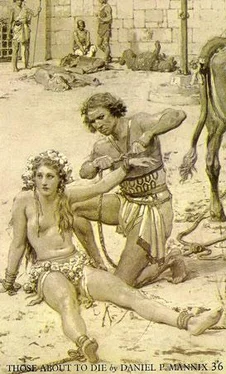Daniel Mannix - Those About to Die
Здесь есть возможность читать онлайн «Daniel Mannix - Those About to Die» весь текст электронной книги совершенно бесплатно (целиком полную версию без сокращений). В некоторых случаях можно слушать аудио, скачать через торрент в формате fb2 и присутствует краткое содержание. Год выпуска: 1972, ISBN: 1972, Издательство: Mayflower Books Ltd, Жанр: Исторические приключения, на английском языке. Описание произведения, (предисловие) а так же отзывы посетителей доступны на портале библиотеки ЛибКат.
- Название:Those About to Die
- Автор:
- Издательство:Mayflower Books Ltd
- Жанр:
- Год:1972
- ISBN:978-0583121347
- Рейтинг книги:4 / 5. Голосов: 1
-
Избранное:Добавить в избранное
- Отзывы:
-
Ваша оценка:
- 80
- 1
- 2
- 3
- 4
- 5
Those About to Die: краткое содержание, описание и аннотация
Предлагаем к чтению аннотацию, описание, краткое содержание или предисловие (зависит от того, что написал сам автор книги «Those About to Die»). Если вы не нашли необходимую информацию о книге — напишите в комментариях, мы постараемся отыскать её.
Those About to Die — читать онлайн бесплатно полную книгу (весь текст) целиком
Ниже представлен текст книги, разбитый по страницам. Система сохранения места последней прочитанной страницы, позволяет с удобством читать онлайн бесплатно книгу «Those About to Die», без необходимости каждый раз заново искать на чём Вы остановились. Поставьте закладку, и сможете в любой момент перейти на страницу, на которой закончили чтение.
Интервал:
Закладка:
Whole territories were denuded of wild animals to supply the arena. The early Christian fathers could only find one good thing to say about the bloody spectacles—the demand for animals cleared entire districts of dangerous predators and opened them to farming. Several species were either exterminated or so reduced in numbers that they later became extinct: the European lion, the aurochs, the Libyian elephant and possibly the African bear. There are no bears in Africa
today and most scientists believe that there never were any, but the Romans did get a "bear" from East Africa and Nubia. What was it?
We don't know, but curiously in Kenya today there is a persistent legend of a "Nandi bear,'' supposedly a very large and ferocious bear which lives in the Aberdare Mountains. It occasionally attacks natives and has been seen by a few white people although no specimen had ever been brought in. Recently, the site of a Roman "trapping station" has been found in this locality. Perhaps the Romans' "African bear" still exists.
Collecting and shipping these thousands of animals was an enormous industry. Wild animals were the most valuable gift a barbarian monarch could make to his Roman overlords, and even Roman governors had to collect animals. There is an interesting and amusing series of letters between Cicero, a newly appointed governor of a province in Asia Minor, and Cselius Rufus, who was running for the office of aedile in Rome. Rufus wanted leopards for the games he was giving. Cicero was busy trying to administer his province and wasn't interested in catching leopards. Even before poor Cicero got to his province, he got a letter from Rufus: "Dear Cicero: please try to get me some good leopards . . . ten will do for a start. Tell your natives to hurry." When no leopards arrived, Rufus wrote: "My dear friend Cicero: In nearly all my letters I've mentioned the subject of leopards to you. It would be a terrible disgrace if, after Patiscus (a local Roman businessman in the same area) has sent me ten, you can't send me any more. I have those ten and ten more from Africa. If I don't hear from you, I'll have to make arrangements elsewhere." Later: "If I hadn't got some African animals from Curio, I wouldn't be able to put on a show at all. If you don't send me some leopards, don't expect any patronage from me."
Cicero wrote to a friend: "Another letter from Rufus . . . all he talks about is leopards." Then Rufus gave his games and got elected to the aedileship. Right away Cicero wrote him: "Dear, dear Rufus: I can't tell you how sorry I am about the leopards. I've put all the professional hunters to work, but there seems to be the most remarkable scarcity of wild beasts at this time of the year. But don't worry, I have everyone working on it and anything we get will be for you and no one else "
Rufus had a right to be annoyed. Sulla, who became dictator, freely admitted that the people had originally voted him into office only because he had a tie-in with Bocchus, an African monarch, and could get plenty of animals for the games. In search of animals, the Roman trappers went to Norway, where they brought back moose and elk; to Burma, for rhino, cobra and elephants; and to Lake Victoria in the heart of Africa. As today, Africa was the great trapping ground for wild animals. The Romans even exhibited African porcupines in the arena; naked boys had to catch them with their bare hands. Plautus, a Roman humorist, wrote: "By the gods, next they'll be giving exhibitions of trained African mice."
From various sources, let's create the character Fulcinius, a professional animal trapper whose territory was Africa. We can suppose that Fulcinius was a half-caste, the son of a Roman legionnaire stationed in Algeria, by a Negro mother. As today, half-castes were not popular with either race, and Fulcinius grew up a lonely boy, considering himself superior to his mother's people but knowing that he would never be accepted by Romans. Roman writers describe such a man as a "savage among savages, a shy, sullen man who hated society and was only happy in the jungle."
Fom his mother's people, Fulcinius learned the tricks of animal catching, which have remained unchanged to the present day. He learned how to dig a pit, surround it with a high wooden fence, and tether a young calf in the pit. When a lion heard the kid bleating, he would jump over the fence, fall into the pit and be caught. He learned how to direct natives to drive heards of antelope into rivers where they could be lassoed by men in boats, or herded down ravines covered with slippery rawhides so the animals would lose their footing and could be hogtied by waiting men. He organized hundreds of beaters to move in from all sides through a stretch of jungle, driving the animals into a smaller and smaller space. At last, Numidian spearmen with their great oval shields formed a wall around the captives and held them long enough so men with lassos and nets could complete the capture. Apparendy even lions were caught in this manner. There's a picture of it in the Roman villa at Bona, Algeria.
The recently uncovered villa near the village of Armerina, Sicily, contains frescos—some of them sixty-six yards long— showing in great detail how animals were captured and crated for shipment. The villa is thought to have been the summer home of the Emperor Marcus Aurelius Valerius Maximianus who ruled about 300 a.d. That the emperor should have devoted so much space to pictures of capturing animals shows how vital this profession was to the Romans.
In one mosaic, mounted men are shown driving stags into a circle of nets, one stag having already been caught by his antlers. Another shows men loading elephants onto a galley while others drag an unwilling rhino calf toward the gangplank as trained dogs snap at the animal from the rear. Still others show a Roman animal catcher with a huge shield pointing to a lion who is eating an oryx he has just killed. The animal catcher is directing his Moorish assistants how to surround and net the animal. One mosaic shows a cart pulled by oxen with native drivers and on the cart is a big wooden shipping crate containing a lion or a leopard. An animal catcher walks beside the crate, steadying it with his hand. On top of the crate is a funnel-like arrangement which is often shown in these pictures. Unless it was used for pouring water into the cage, I can't imagine its purpose. A mural shows men carrying cranes onto a ship and two men are wrestling a hartebeest onboard. Others are carrying up the gangplank wild boars wrapped in nets and suspended from poles.
Fulcinius must have done all these things and many more too. He must have caught elephants by driving them into box canyons and, as he probably didn't have enough trained elephants to take them out, starved them into submission by giving them only enough barley water to keep them alive. He also hired Numidians to crawl among a herd and hamstring the mothers with their spears so the young could be captured. He caught chimpanzees and baboons by putting out bowls of wine and then picking up the animals after they were drunk. To catch pythons, he prepared a long bag made of rushes which he put near the snake. The snake was then driven toward the bag and dunking it a hole, would crawl inside. Then the cords closing the mouth of the bag were closed. When a "bear" (whatever the African bear was) was found in its den, nets were hung on the outside and the bear driven out with trumpet peals and yells. Nooses were set in game trails and animals driven into them. Along the sides of the trails, coloured streamers were hung from lines so that the animals, alarmed by the strange objects, would stay on the trails and not bolt off into the bush.
Читать дальшеИнтервал:
Закладка:
Похожие книги на «Those About to Die»
Представляем Вашему вниманию похожие книги на «Those About to Die» списком для выбора. Мы отобрали схожую по названию и смыслу литературу в надежде предоставить читателям больше вариантов отыскать новые, интересные, ещё непрочитанные произведения.
Обсуждение, отзывы о книге «Those About to Die» и просто собственные мнения читателей. Оставьте ваши комментарии, напишите, что Вы думаете о произведении, его смысле или главных героях. Укажите что конкретно понравилось, а что нет, и почему Вы так считаете.












